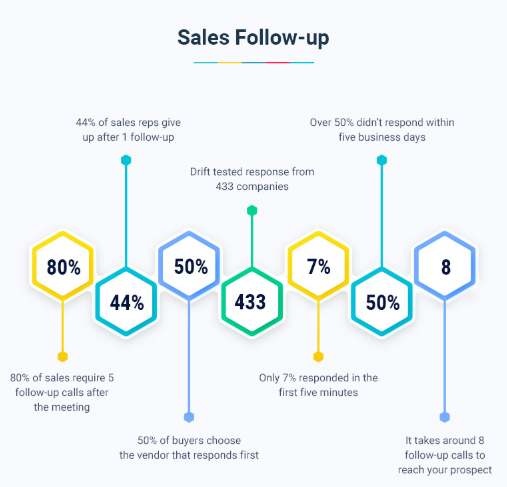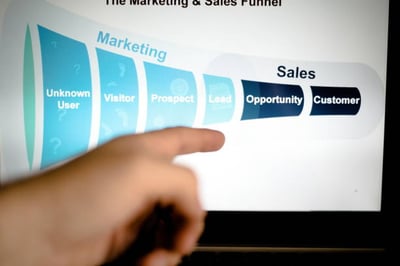April 28, 2020
 by Kashyap Trivedi / April 28, 2020
by Kashyap Trivedi / April 28, 2020

Sales is filled with endless A/B testing.
You try a bunch of approaches, and some of them work while some of them don’t. To be honest, all these approaches work on an individual level. Something that works for one person may not necessarily for someone else.
Regardless of the various methods that exist, the bottom line is that there are recurring sales mistakes that every individual should avoid. Let’s dive in and figure out which ones there are and how to avoid making the mistakes over and over again.
Whether you’re a salesperson by trade or a freelancer, these are six detrimental sales mistakes that you might be making during calls, face-to-face meetings, or even while shooting follow-up emails.
Every industry has faced some kind of stereotype, like doctors have awful handwriting and bloggers only want links. Salespeople give off the impression that they’re only interested in selling their product, nothing more.
As the role of salespeople has changed over time, you can’t just sell your product and hope for the best. Modern salespeople should act as consultants who are interested in solving a business problem rather than just selling their product.
If you’re still starting your calls with an immediate ask, e.g. “Are you looking to invest in a marketing agency? If so, I have the deal for you,” then you’re doing it wrong. The problem with starting your call or meeting like this is that everybody knows it’s a sales pitch, and people won’t hesitate to say no to your face.
It’s predictable.
Let your initial calls and meetings be about finding out the problems your prospect is facing. Then, your focus should be on providing the best possible solutions to your prospects. And as a part of the solution, you can include your product or service.
The best way to start your conversation like a consultant is to do in-depth research on your prospects. A good way to start your research is by looking at their website or checking their social media handles. Prospects often share their business needs on social media sites like LinkedIn.
Here is an example:

In response to this post, you can start the conversation off like:
“Hey, I recently checked out your LinkedIn post and found that you are looking for a PR agency. I am Mark from WeMarket, and we are a marketing agency from New York. Can we discuss what exactly your needs are and see if we’re a good fit?”
This way, you open a two-way conversation and don’t come across as cold pitching to an empty room.
Many sales reps forget that the sales calls they make are not about them. Every sales call is about customers and solving their problems. In a way, sales reps are like a bridge that joins customers to the right solution.
Talking constantly during a meeting or a call is probably the worst sales mistake you can make. Instead, ask relevant questions whenever you feel the need, like questions that can help you understand the nature of the problem. Then, listen to the answers that prospects give.
Eighty percent of prospects prefer to talk over the phone, so you can note down the important points or you can record calls for reference as well.
These are some of the questions that you can ask:
A very productive activity you can do is to send an email once your call or meeting is over so that your prospect can remember key discussion points. This simple activity helps you remember what they really want, and it helps you open another channel of communication.
You can simply ask for their email address after the meeting, or use a tool to help you find the right email addresses to benefit your cold email outreach.
As a salesperson, answering a question that you don’t know will not only jeopardize your image but your brand as well. It’s much more than a sales mistake. It’s a terrible sales crime to commit.
Just imagine, if the prospect takes a decision based on the false information you gave. They might choose the wrong product or service, or if your team couldn’t deliver the outcome, or the whole deal goes down – the list goes on.
In these scenarios, customers do leave with a bad impression of your brand. That is way more harmful than you think and should be committed to close a deal. Giving false information on your product is unacceptable. Your role is to help the prospect make the right decision, not to mislead them.
Understand your product or service from the very core. If you are selling a product, use it on a daily basis. Doing so will help you understand the advantages and limitations of your product.
Salespeople are the people who suggest new features to the development team because they know where the product is lacking. They know what new features their prospects are asking for, and they know how many competitors are providing such a feature.
In order to posit yourself as an expert, you have to constantly ask questions so that when a prospect asks, you can answer without any hesitation. Beyond learning about your product, spend some time learning about your company and important sales metrics for your business. Prospects also like to know about your company, not just your product.
In situations where you don’t know the answer to prospects’ questions, simply respond that you will find out and let them know. This approach shows you’re transparent, honest, and can position you better for future meetings.
Pricing has a lot to do with psychology. We have to understand that it is one of the most important factors for a decision-maker. So withholding the price is probably among the biggest sales mistakes of all time.
A salesperson may withhold pricing to increase the interest of prospects, but a decision-maker has preferences already in mind. If your pricing is way beyond their budget, they will not waste time even understanding your product.
For your benefit, it’s better to be open about product or service pricing. This approach is helpful for both the salesperson and the prospect. That way, your prospect will know off the bat if your product is in their budget or not. Then, you can invest your energy in the right meetings. If you can’t give out pricing in the beginning, there are other ways you can pass on the message.
Try language like this:
The prospect will figure out if they can use your product or not with competitor information. With the effective use of words, you can pass on the pricing range way before you want to.
Unlike the age-old adage, we know the customers aren’t always right. But that doesn’t mean you should argue with a prospect when they’re wrong. As a salesperson, your job and goal is not to prove the prospect wrong. Your goal is to help them.
Whether you’re dealing with a prospect or a customer, ask yourself the following questions in situations like these:
Even though your customers aren’t always right and you don’t want to argue with them, sometimes you have to show them that they are wrong and might face a loss in the future.
Here is a nice way to show that you care about your customer but you have to point out what is right for them:
“I totally understand your point. But I think if you continue with the same process, there might be a monetary loss in the near future. Many companies lose millions of dollars because they don’t manage their data mindfully. I think a CRM would not only streamline your sales process but will also provide valuable data that spreadsheets simply can’t. I’d love to explain how our CRM can help streamline your business processes, if you’re open to discussing it further.”
Be very mindful of the arguments you are entering into. If the prospect is wrong and it’s not harmful to you or their business, you can let things go and move on.
Lack of follow-up might be one of the worst mistakes a good salesperson can make. Eighty percent of sales require five follow-up calls to convert, but 44% of sales reps give up after the initial conversation. You need to understand that one call is not enough to get a special place in the prospect’s mind. You have to constantly remind them that you and your product exist.

You can create a perfect sequence of emails for your follow-up outreach. A good email marketing tool or CRM can help you design a perfect sequence of follow-ups using automation. All you need to do is feed the email content and decide on the duration of time. With automation in hand, you can periodically let your prospects know that you have proposed the right solution to them and they should take a look.
You are the face of your sales journey. Your mistakes are yours, and your learning is also yours.
In order to find your improvement zones, start recording your calls or meetings. Once the session is over, listen to yourself and prospect very carefully. Listen to what you said and how the prospect has responded. Note down your tone, and make points on where you can improve.
Staying mindful is the biggest skill you can achieve in sales. This quality will help you identify the mistakes you are committing quickly. What’s more, the sooner you identify your mistakes, the sooner you can work to improve on them.
Close deals and win over prospects with the best sales training software solutions on G2.
Kashyap Trivedi is a Growth Marketer at Salesmate. He loves talking about content-led growth, creating and experimenting with a new content and distribution model. You can find him meditating or playing table tennis when he's not working.
Providing great customer service is not a choice or luxury; it's a standard your customers...
 by Kinga Odziemek
by Kinga Odziemek
A robust sales pipeline is at the heart of any fast-growing business.
 by Yash Vardhan
by Yash Vardhan
Ho ho ho! Holidays are coming, baubles deck the halls everywhere you look, and you can smell...
 by Kinga Odziemek
by Kinga Odziemek
Providing great customer service is not a choice or luxury; it's a standard your customers...
 by Kinga Odziemek
by Kinga Odziemek
A robust sales pipeline is at the heart of any fast-growing business.
 by Yash Vardhan
by Yash Vardhan


